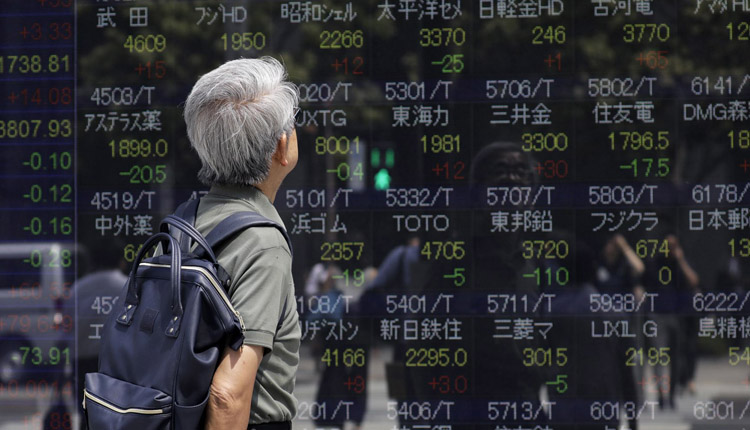Asian markets largely declined after U.S. indexes pulled back overnight on recession fears.
Some analysts said the selloff in stocks pointed to “deep-seated worries” among investors.
“Fact is, a rollcall of crises appear to be bubbling up — from Italian politics to Brexit to US-China conflict — threatening to blow out rather than blow over,” Vishnu Varathan, head of economics and strategy at Mizuho Bank, wrote in a morning note.
“Global policy-makers do not appear to have plans that make the cut for resolving these,” Varathan added.
Japan’s Nikkei 225 dropped 0.28% to 20,618.57, retracing some of its earlier losses, and the Topix index declined 0.61% to 1,497.51.
The Japanese yen traded at 106.54 against the dollar, weakening from levels below 106 in the previous week.
Automakers mostly declined as shares of Nissan dropped 1.52%, Mazda Motor fell 3.23% while Toyota erased earlier losses to finish flat. Tech conglomerate SoftBank Group slipped 2.86% while banking and financial stocks also traded lower.
In South Korea, the Kospi index erased losses to trade 0.22% higher at 1,964.65 and Kosdaq was up 1.47%. Major stock indexes in India, Singapore and Indonesia also traded lower in the afternoon.
Hong Kong’s Hang Seng index rose about 0.2% in late afternoon trade while shares of Xiaomi tumbled 4.98%. The Chinese smartphone maker, which is listed in Hong Kong, reported 15% growth in quarterly revenue on Tuesday, missing estimates as fewer people bought smartphones at home, and as rival Huawei grabbed more market share, Reuters reported.
The Shanghai composite on mainland China was fractionally higher at 2,880.33 while the Shenzhen composite was down about 0.1%. The onshore Chinese yuan traded at 7.0591 against the dollar after the People’s Bank of China set the daily midpoint rate at 7.0433, slightly stronger than a Reuters estimate.
Offshore yuan, which is traded outside mainland China and has comparatively fewer restrictions, traded at 7.0643.
Australia’s ASX 200 fell 0.94% to 6,483.30 with the heavily-weighted financial subindex down 0.62%. The country’s so-called Big Four banks sold off: ANZ shares were down 1.16%, Commonwealth Bank dropped 0.14%, Westpac was down 1.82% and the National Australia Bank fell 0.69%.
The Australian dollar traded mostly sideways and changed hands at $0.6775.
Elsewhere, the U.S. dollar last traded at 98.264 against a basket of its peers, climbing from an earlier low of 97.948.
The session in Asia followed declines in the U.S. and in Europe on Tuesday, where Italy’s mounting political crisis likely caused a dent in investor sentiment.
Italian Prime Minister Giuseppe Conte announced his intention to resign — he had been under pressure since one of the country’s deputy prime ministers, Matteo Salvini, called for a snap election. The euro traded at $1.1092, declining from an earlier high of $1.1105.
“Markets traded on little news flow as investors await guidance from central bankers into the end of the week,” Adelaide Timbrell said in an early morning note, pointing to policy meeting minutes that are due from the U.S. Federal Open Market Committee and the European Central Bank.
